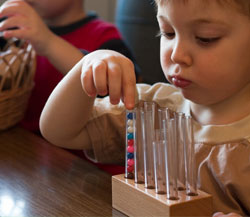As spring approaches, parents and teachers are beginning to think about and make plans for the next school year. The 3 ½ to 4 year olds are growing like weeds and will be even taller when they return for their second year of Montessori in the fall. There will be a whole new group of 2 ½ to 3 year olds who will begin their first year in September.
The timeless question each year is whether the 4 ½ to 5 year olds will return for their third year in the Montessori primary program. The kindergarten year has a character of its own; functioning like a bridge to the next level of development. It is a step that is layered with numerous considerations for the family unit.
Parents are faced with a number of concerns and questions: The cost of tuition, school location, social impact, academic curriculum… These are all valid considerations and every family weighs the pros and cons to make the best choice possible.
Some people question whether this transition year to elementary school has a lasting impact on the overall development of the child. When it comes to reflecting back on their own experiences, most adults say, “We all seem to turn out fine.” There is no definitive answer, only a parent’s best instincts, based on good research and information gathering.
This leads us to consider the illusive quality of the human potential. It is not measurable or visible. We can never know how we would have turned out if we had chosen another path. It becomes a matter of trust. How will a parent’s choices determine the capacity for their child to develop into a global citizen who has the ability to become useful and successful in the adult world?
After much thought to try and single out any perceivable difference in the students who complete their 5-year old year in our Montessori classrooms, we see one consistent quality:
Leadership.
The Montessori educational model offers a unique opportunity to children in their kindergarten year: The 5 year olds experience being at the top of the heap, long before the traditional school structure where this doesn’t happen until grade 6. They are now the oldest in a classroom of peers that they have known for three years. While they work at mastering the educational materials and the skills involved, they naturally begin to take on a leadership role in school.
By definition, the qualities of a leader are: The ability to establish a clear vision, to share that vision with others so that they will follow willingly, and to provide the information, knowledge and methods to realize that vision. Leaders have the ability to make decisions for themselves, are able to stand up to peer pressure, and set a personal standard of behavior.
It is our privilege as teachers, to observe these young children as they experience their first taste of leadership in the Montessori school setting. In the kindergarten year, the five year olds are ready to take on age-appropriate responsibilities. One way is to give lessons to their younger classmates. By sharing their knowledge and expertise, the five year old internalizes and consolidates the academic work they already know. They also become good communicators and like to help problem-solve with any situation that may arise in the classroom.
The five year olds enjoy leading small group activities and discussions. They are also helpful with their classmates, offering to assist in cleaning up a spill, threading a needle, or zipping up a coat.
The third year of the Montessori primary program is the culmination of the child’s social, emotional and academic experiences. It solidifies all the learning and experiences from the previous two years. And it prepares them for the next educational plane of development: The elementary level.
There are many articles online on the topic. One we recommend highly is called Why Montessori for the Kindergarten Year? by Tim Seldin, President of the Montessori Foundation. Tomorrow’s Child magazine publishes excellent articles related to all things Montessori for parents and teachers looking for a better understanding of the pedagogy and curriculum.






